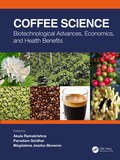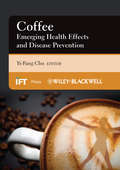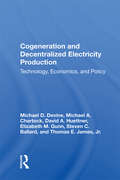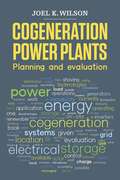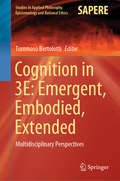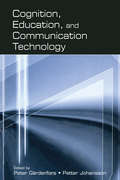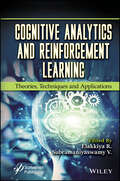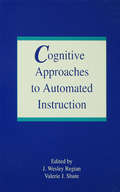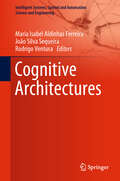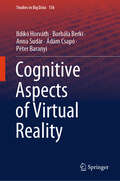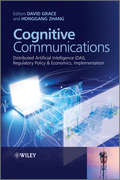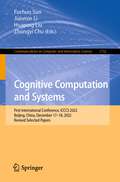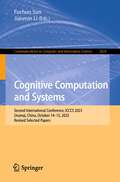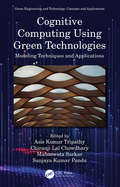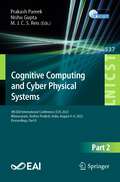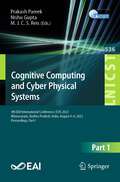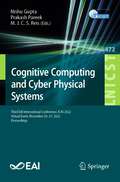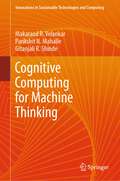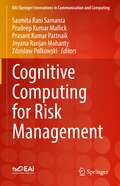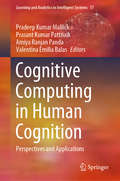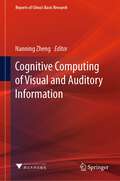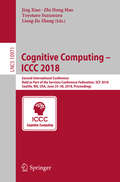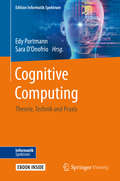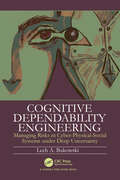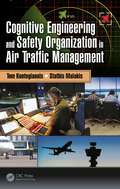- Table View
- List View
Coffee Science: Biotechnological Advances, Economics, and Health Benefits
by Akula Ramakrishna Magdalena Jeszka-Skowron Parvatam GiridharCoffee Science: Biotechnological Advances, Economics and Health Benefits highlights the important advances in coffee research and an all-inclusive collection of information on the current status of global coffee production and market, sustainable benefits, novel methods and recent developments in coffee metabolites analysis, advancements in coffee processing technology and improvement of coffee quality by fermentation, solid-liquid extraction methods, and post-harvesting processes to improve the beverage quality and produce coffees with different sensory profiles. The book compiles insights into the biotechnological advances to improve coffee quality. It also describes specialty coffees, which are gaining consumer acceptance and enjoying a good global market. This book collates work on the influence of various coffee metabolites such as methyl xanthine, polyphenols, phenolic compounds, indoleamines, biogenic amines, and coffee diterpenes in human health effects such as cardiovascular diseases, cancer, type 2 diabetes mellitus, Alzheimer’s disease, and Parkinson’s disease. This book is a useful resource for scientists, academicians, and professionals all over the world who are engaged in coffee cultivation, research, business and coffee consumers’ health. Key Features Current status on coffee production and the global market Novel methods and recent developments in the determination of coffee metabolites Advancements in coffee bean processing technology and improvement of coffee quality Biotechnological advances to improve coffee quality: The role of molecular markers, tissue culture, transgenic technology, and micro RNAs Effects of coffee consumption on human health Knowledge contributions from acknowledged experts from across the world
Coffee: Emerging Health Effects and Disease Prevention (Institute of Food Technologists Series #62)
by Yi-Fang ChuCoffee: Emerging Health Benefits and Disease Prevention presents a comprehensive overview of the recent scientific advances in the field. The book focuses on the following topics: coffee constituents; pro- and antioxidant properties of coffee constituents; bioavailability of coffee constituents; health benefits and disease prevention effects of coffee; and potential negative impacts on health. Multiple chapters describe coffee's positive impact on health and various diseases: type 2 diabetes; neurodegenerative diseases (Parkinson's and Alzheimer's); cancer (prostate, bladder, pancreatic, breast, ovarian, colon and colorectal); cardiovascular health; and liver health. Coffee's positive effects on mood, suicide rate and cognitive performance are addressed as are the negative health impacts of coffee on pregnancy, insulin sensitivity, dehydration, gastric irritation, anxiety, and withdrawal syndrome issues. Written by many of the top researchers in the world, Coffee: Emerging Health Benefits and Disease Prevention is a must-have reference for food professionals in academia, industry, and governmental and regulatory agencies whose work involves coffee.
Cogeneration And Decentralized Electricity Production: Technology, Economics, And Policy
by Michael D DevineNew federal and state laws providing tax credits and markets to independent producers of electricity have created widespread interest in the development of small, dispersed power plants using cogeneration processes, waste, or renewable resources. Recent legislation also promotes decentralized electricity production by allowing unregulated, non-util
Cogeneration Power Plants: Planning and Evaluation
by Joel K. WilsonThis book is intended to help those interested in cogeneration power plants by laying out a thorough and proven planning methodology for new facilities, as well as an evaluation methodology for existing facilities.
Cognition in 3E: Multidisciplinary Perspectives (Studies in Applied Philosophy, Epistemology and Rational Ethics #56)
by Tommaso BertolottiThis book originated at a workshop by the same name held in May 2018 at the University of Pavia. The aim was to encourage a cross-disciplinary discussion on the limits of cognition. When venturing into cognitive science, notwithstanding the approach, one of the first riddles to be solved is the definition of cognition. Any definition immediately sparks the ascription debate: who/what cognizes? Definitions may appear either too loose, or too demanding. Are bacteria included? What about plants? Is it a human prerogative? We engage in the quest for artificial intelligence, but is artificial cognition already the case? And if it was a human prerogative, are we doing it all the time? Is cognition a process, or the sum of countless sub processes? Is it in the brain, or also in the body? Or does it go beyond the body? Where does it start? Where does it end? We tried answering these questions each from our own perspectives, as philosophers, ethnographers, psychologists and rhetoricians, handing each other our peculiar insight.
Cognition, Education, and Communication Technology
by Peter Gärdenfors Petter JohanssonCognition, Education, and Communication Technology presents some of the recent theoretical developments in the cognitive and educational sciences and implications for the use of information and communication technology (ICT) in the organization of school and university education. Internationally renowned researchers present theoretical perspectives with proposals for and evaluations of educational practices. Each chapter discusses different aspects of the use of ICT in education, including:*the role of perceptual processes in learning;*external cognition as support for interactive learning;*the role of meta-cognition;*simulation learning environments as cognitive tools;*the role of science controversy for knowledge integration;*the use of ICT in the development of educators; and*the role of narratives in education.ICT has great potential for revolutionizing education. Large investments of resources are being made, often without a strong understanding of how ICT will or should be implemented. The expectation is that students will show immediate improvements in terms of their motivation to learn and their learning achievements, but reality is different. Progress of ICT in education requires more than just computers in the classroom. It demands an understanding of the complex processes contributing to human learning and how they interact with new technologies. This text provides theoretical perspectives on the learning processes that can be used as a foundation for constructing pedagogically valuable tools based on ICT.The combination of results--from cognitive science and pedagogy, with more practically oriented suggestions for how ICT can be used in various forms of education--makes this book suitable for researchers and students in the cognitive and educational sciences, as well as for practitioners and planners of education.
Cognitive Analytics and Reinforcement Learning: Theories, Techniques and Applications
by R. Elakkiya Subramaniyaswamy V.COGNITIVE ANALYTICS AND REINFORCEMENT LEARNING The combination of cognitive analytics and reinforcement learning is a transformational force in the field of modern technological breakthroughs, reshaping the decision-making, problem-solving, and innovation landscape; this book offers an examination of the profound overlap between these two fields and illuminates its significant consequences for business, academia, and research. Cognitive analytics and reinforcement learning are pivotal branches of artificial intelligence. They have garnered increased attention in the research field and industry domain on how humans perceive, interpret, and respond to information. Cognitive science allows us to understand data, mimic human cognitive processes, and make informed decisions to identify patterns and adapt to dynamic situations. The process enhances the capabilities of various applications. Readers will uncover the latest advancements in AI and machine learning, gaining valuable insights into how these technologies are revolutionizing various industries, including transforming healthcare by enabling smarter diagnosis and treatment decisions, enhancing the efficiency of smart cities through dynamic decision control, optimizing debt collection strategies, predicting optimal moves in complex scenarios like chess, and much more. With a focus on bridging the gap between theory and practice, this book serves as an invaluable resource for researchers and industry professionals seeking to leverage cognitive analytics and reinforcement learning to drive innovation and solve complex problems. The book’s real strength lies in bridging the gap between theoretical knowledge and practical implementation. It offers a rich tapestry of use cases and examples. Whether you are a student looking to gain a deeper understanding of these cutting-edge technologies, an AI practitioner seeking innovative solutions for your projects, or an industry leader interested in the strategic applications of AI, this book offers a treasure trove of insights and knowledge to help you navigate the complex and exciting world of cognitive analytics and reinforcement learning. Audience The book caters to a diverse audience that spans academic researchers, AI practitioners, data scientists, industry leaders, tech enthusiasts, and educators who associate with artificial intelligence, data analytics, and cognitive sciences.
Cognitive Approaches To Automated Instruction
by Valerie J. Shute J. Wesley RegianUseful to researchers as well as practitioners looking for guidance on designing automated instruction systems, this book provides a snapshot of the state-of-the-art in this research area. In so doing, it focuses on the two critical problems: first, diagnosis of the student's current level of understanding or performance; and second, selection of the appropriate intervention that will transition the student toward expert performance. Containing a comprehensive set of principled approaches to automated instruction, diagnosis, and remediation, it is the first volume on the topic to provide specific, detailed guidance on how to develop these systems. Leading researchers and practitioners represented in this book address the following questions in each chapter: * What is your approach to cognitive diagnosis for automated instruction? * What is the theoretical basis of your approach? * What data support the utility of the approach? * What is the range of applicability of your approach? * What knowledge engineering or task analysis methods are required to support your approach? Referring to automated instruction as instruction that is delivered on any microprocessor-based system, the contributors to -- and editors of -- this book believe that is it possible for automated instructional systems to be more effective than they currently are. Specifically, they argue that by using artificial intelligence programming techniques, it is possible for automated instructional systems to emulate the desirable properties of human tutors in one-on-one instruction.
Cognitive Architectures (Intelligent Systems, Control and Automation: Science and Engineering #94)
by Maria Isabel Aldinhas Ferreira João Silva Sequeira Rodrigo VenturaThis book provides an integrated framework for natural and artificial cognition by highlighting the fundamental role played by the cognitive architecture in the dialectics with the surrounding environment and consequently in the definition of a particular meaningful world.This book is also about embodied and non-embodied artificial systems, cognitive architectures that are human constructs, meant to be able to populate the human world, capable of identifying different life contexts and replicating human patterns of behavior capable of acting according to human values and conventions, systems that perform tasks in a human-like way. By identifying the essential phenomena at the core of all forms of cognition, the book addresses the topic of design of artificial cognitive architectures in the domains of robotics and artificial life. Moving from mere bio-inspired design methodology it aims to open a pathway to semiotically determined design.
Cognitive Aspects of Virtual Reality (Studies in Big Data #156)
by Péter Baranyi Ildikó Horváth Borbála Berki Anna Sudár Ádám CsapóThis book outlines a range of user experiments, providing comprehensive evaluations that underline the rationale behind implementing collaborative 3D virtual offices in corporate settings and 3D classrooms in educational institutions. In this book, radically new scientific approaches are taken for studying user effectiveness in the realm of 3D graphical interfaces. The emergence of VR is seen in the book as a pivotal moment in the evolution of information technology, marking a shift from the era of DOS and Windows to immersive digital spaces. Through extensive research and experimentation, it is convincingly demonstrated that integrating 2D user interfaces, such as windows, images, and 2D widgets, into 3D digital environments significantly enhances user effectiveness in terms of online collaboration, memory, recall, and comprehension of complex workflows. Moreover, valuable advice and design principles are offered to guide the creation of such working 3D digital environments.
Cognitive Communications
by Honggang Zhang David GraceThis book discusses in-depth the concept of distributed artificial intelligence (DAI) and its application to cognitive communicationsIn this book, the authors present an overview of cognitive communications, encompassing both cognitive radio and cognitive networks, and also other application areas such as cognitive acoustics. The book also explains the specific rationale for the integration of different forms of distributed artificial intelligence into cognitive communications, something which is often neglected in many forms of technical contributions available today. Furthermore, the chapters are divided into four disciplines: wireless communications, distributed artificial intelligence, regulatory policy and economics and implementation. The book contains contributions from leading experts (academia and industry) in the field.Key Features:Covers the broader field of cognitive communications as a whole, addressing application to communication systems in general (e.g. cognitive acoustics and Distributed Artificial Intelligence (DAI)Illustrates how different DAI based techniques can be used to self-organise the radio spectrumExplores the regulatory, policy and economic issues of cognitive communications in the context of secondary spectrum accessDiscusses application and implementation of cognitive communications techniques in different application areas (e.g. Cognitive Femtocell Networks (CFN)Written by experts in the field from both academia and industryCognitive Communications will be an invaluable guide for research community (PhD students, researchers) in the areas of wireless communications, and development engineers involved in the design and development of mobile, portable and fixed wireless systems., wireless network design engineer. Undergraduate and postgraduate students on elective courses in electronic engineering or computer science, and the research and engineering community will also find this book of interest.
Cognitive Computation and Systems: First International Conference, ICCCS 2022, Beijing, China, December 17–18, 2022, Revised Selected Papers (Communications in Computer and Information Science #1732)
by Huaping Liu Fuchun Sun Jianmin Li Zhongyi ChuThis volume constitutes selected papers presented during the First International Conference on Cognitive Computation and Systems, ICCCS 2022, held in Beijing, China, in October 2022.The 31 papers were thoroughly reviewed and selected from the 75 submissions. The papers are organized in topical sections on computer vision; decision making and cognitive computation; robot and autonomous vehicle.
Cognitive Computation and Systems: Second International Conference, ICCCS 2023, Urumqi, China, October 14–15, 2023, Revised Selected Papers (Communications in Computer and Information Science #2029)
by Fuchun Sun Jianmin LiThis book constitutes the refereed proceedings of the Second International Conference on Cognitive Computation and Systems, ICCCS 2023, held in Urumqi, China, October 14–15, 2023.The 26 full papers included in the book were carefully reviewed and selected from 68 submissions. ICCCS aims to bring together experts from different expertise areas to discuss the state-of-the-art in cognitive computing and intelligent systems, and to present new research results and perspectives on future development. They were organized in topical sections as follows: Perception and learning and decision making and systems.
Cognitive Computing Using Green Technologies: Modeling Techniques and Applications (Green Engineering and Technology)
by Asis Kumar TripathyCognitive Computing is a new topic which aims to simulate human thought processes using computers that self-learn through data mining, pattern recognition, and natural language processing. This book focuses on the applications of Cognitive Computing in areas like Robotics, Blockchain, Deep Learning, and Wireless Technologies. This book covers the basics of Green Computing, discusses Cognitive Science methodologies in Robotics, Computer Science, Wireless Networks, and Deep Learning. It goes on to present empirical data and research techniques, modelling techniques and offers a data-driven approach to decision making and problem solving. This book is written for researchers, academicians, undergraduate and graduate students, and industry persons who are working on current applications of Cognitive Computing.
Cognitive Computing and Cyber Physical Systems: 4th EAI International Conference, IC4S 2023, Bhimavaram, Andhra Pradesh, India, August 4-6, 2023, Proceedings, Part II (Lecture Notes of the Institute for Computer Sciences, Social Informatics and Telecommunications Engineering #537)
by Nishu Gupta Prakash Pareek M. J. C. S. ReisThis 2-volume set constitutes the post-conference proceedings of the 4th International Conference on Cognitive Computing and Cyber Physical Systems, IC4S 2023, held in Bhimavaram, Andhra Pradesh, India, during August 4-6, 2023. The theme of IC4S 2023 was: cognitive approaches with machine learning and advanced communications. The 70 full papers were carefully reviewed and selected from 165 submissions. The papers are clustered in thematical issues as follows: machine learning and its applications; cyber security and signal processing; image processing; smart power systems; smart city eco-system and communications.
Cognitive Computing and Cyber Physical Systems: 4th EAI International Conference, IC4S 2023, Bhimavaram, Andhra Pradesh, India, August 4-6, 2023, Proceedings, Part I (Lecture Notes of the Institute for Computer Sciences, Social Informatics and Telecommunications Engineering #536)
by Nishu Gupta Prakash Pareek M. J. C. S. ReisThis 2-volume set constitutes the post-conference proceedings of the 4th EAI International Conference on Cognitive Computing and Cyber Physical Systems, IC4S 2023, Bhimavaram, Andhra Pradesh, India, during August 4-6, 2023. The theme of IC4S 2023 was: cognitive approaches with machine learning and advanced communications. The 70 full papers were carefully reviewed and selected from 165 submissions. The papers are clustered in thematical issues as follows: machine learning and its applications; cyber security and signal processing; image processing; smart power systems; smart city eco-system and communications.
Cognitive Computing and Cyber Physical Systems: Third EAI International Conference, IC4S 2022, Virtual Event, November 26-27, 2022, Proceedings (Lecture Notes of the Institute for Computer Sciences, Social Informatics and Telecommunications Engineering #472)
by Nishu Gupta Prakash Pareek M. J. C. S. ReisThis proceedings constitutes the post-conference proceedings of the 3rd EAI International Conference on Cognitive Computing and Cyber Physical Systems, IC4S 2022, held at Vishnu Institute of Technology, Bhimavaram in Andhra Pradesh, India, in November 26-27, 2022. The theme of IC4S 2022 was: cognitive computing approaches with data mining and machine learning techniques. The 22 full papers were carefully reviewed and selected from 88 submissions. The papers are clustered in thematical issues as follows: machine learning and its applications; cyber security and networking; image processing; IoT applications; smart city eco-system and communications.
Cognitive Computing for Machine Thinking (Innovations in Sustainable Technologies and Computing)
by Parikshit N. Mahalle Gitanjali R. Shinde Makarand R. VelankarThis book presents cognitive modeling along with the new paradigm machine thinking to enhance existing AI power and address its current limitations. This book provides overview of natural and artificial intelligence along with the computing models used currently. The need of advancing the current models is presented with suitable examples. The business case studies presented in different domains provide possible use of augmented intelligence with the proposed machine thinking paradigm. This book is targeted at academicians, researchers, students, professionals who belong to disciplines which involves intelligent computing and modelling human thinking. It provides possible multidisciplinary research directions including social psychology, artificial intelligence, HCI, cognition for applications in various domains.
Cognitive Computing for Risk Management (EAI/Springer Innovations in Communication and Computing)
by Prasant Kumar Pattnaik Pradeep Kumar Mallick Zdzislaw Polkowski Sasmita Rani Samanta Jnyana Ranjan MohantyThis book presents applications of cognitive management and cognitive computing in the fields of risk management, cognitive fraud detection, and in business decision making. The book provides insights on how cognitive management and cognitive computing enable businesses to quickly augment human intelligence and help humans perform tasks better. For example, the authors describe how by analyzing patterns in big data, small data, and "dark data," cognitive technologies can detect human behavior and suggest options for personalizing of products and services. The book studies companies in industries such as automotive, airline, health care, retail, wealth management, and litigation who have adopted these approaches.Presents applications of cognitive computing and cognitive management used in augmenting and empowering business decisions;Shows how to employ the Internet of Things in businesses using a cognitive management framework;Discusses technical aspects and alternatives to traditional tools, algorithms, and methodologies in cognitive computing.
Cognitive Computing in Human Cognition: Perspectives and Applications (Learning and Analytics in Intelligent Systems #17)
by Valentina Emilia Balas Prasant Kumar Pattnaik Pradeep Kumar Mallick Amiya Ranjan PandaThis edited book designs the Cognitive Computing in Human Cognition to analyze to improve the efficiency of decision making by cognitive intelligence. The book is also intended to attract the audience who work in brain computing, deep learning, transportation, and solar cell energy. Due to this in the recent era, smart methods with human touch called as human cognition is adopted by many researchers in the field of information technology with the Cognitive Computing.
Cognitive Computing of Visual and Auditory Information (Reports of China’s Basic Research)
by Nanning ZhengThis book discusses fruitful achievements in basic cognitive theories, processing technologies of visual and auditory information and research platforms. This book also can provide strong support for the research and development of artificial intelligence of major national projects, playing important roles in national application systems such as unmanned systems and smart cities. In addition, it has laid a solid foundation for the development of artificial intelligence in China. Intended for researchers who have been following the evolution of and trends in the artificial intelligence, the book is also a valuable reference resource for practitioners and scholars at various levels and in various fields.
Cognitive Computing – ICCC 2018: Second International Conference, Held as Part of the Services Conference Federation, SCF 2018, Seattle, WA, USA, June 25-30, 2018, Proceedings (Lecture Notes in Computer Science #10971)
by Jing Xiao Liang-Jie Zhang Zhi-Hong Mao Toyotaro SuzumuraThis book constitutes the proceedings of the International Conference on Cognitive Computing, ICCC 2018, held as part of SCF 2018, in Seattle, WA, USA, in June 2018. The 15 papers presented in this volume were carefully reviewed and selected from numerous submissions. The papers cover all aspects of Sensing Intelligence (SI) as a Service (SIaaS). Cognitive Computing is a sensing-driven computing (SDC) schema that explores and integrates intelligence from all types of senses in various scenarios and solution contexts.
Cognitive Computing: Theorie, Technik und Praxis (Edition Informatik Spektrum #63)
by Edy Portmann Sara D'OnofrioMit diesem Buch führen die Herausgeber den Begriff „Cognitive Computing“ ein. Unter Cognitive Computing werden verschiedene Technologieansätze wie künstliche neuronale Netze, Fuzzy-Systeme und evolutionäres Rechnen zusammengefasst mit dem Ziel, die kognitiven Fähigkeiten eines Menschen (Denken, Lernen, Schlussfolgern etc.) mithilfe von Computermodellen zu simulieren. Nebst den theoretischen Grundlagen widmet sich das Herausgeberwerk der Vielfalt verschiedener Anwendungsmöglichkeiten und zeigt erste Erfahrungen aus Pionierprojekten. Das Buch richtet sich gleichermaßen an Studierende, Fachleute aller Fachrichtungen sowie den interessierten Anwender. Es hilft dem Leser, die Bedeutungsvielfalt des Begriffs Cognitive Computing zu verstehen und verschiedene Einsatzmöglichkeiten im eigenen Umfeld zu erkennen und zu bewerten.
Cognitive Dependability Engineering: Managing Risks in Cyber-Physical-Social Systems under Deep Uncertainty
by Lech BukowskiThe work is a context-oriented analysis and synthesis of complex engineered systems to ensure continuous and safe operations under conditions of uncertainty. The book is divided in four parts, the first one comprises an overview of the development of systems engineering: starting with basics of Systems Science and Single Systems Engineering, through System of Systems Engineering to Cognitive Systems Engineering. The Cognitive Systems Engineering model was based on the concept of imperfect knowledge acquisition and management. The second part shows the evolutionary character of the dependability concept over the last fifty years. Beginning from simple models based on the classical probability theory, through the concepts of tolerating faults, as well as resilience engineering, we come to the assumptions of Cognitive Dependability Engineering (CDE), based on the concept of continuous smart operation, both under normal and abnormal conditions. The subject of the next part is analysis and synthesis of Cyber-Physical-Social (CPS) Systems. The methodology consists of the following steps: modeling CPS systems' structure, simulating their behavior in changing conditions and in situations of disruptions, and finally assessing the dependability of the entire system based on CDE. The last part of the work answers the question of how to deal with risks in CPS systems in situations of high level of uncertainty. The concept of a Cognitive Digital Twin was introduced to support the process of solving complex problems by experts, and on this basis a framework for cognitive dependability based problemsolving in CPS Systems operating under deep uncertainty was developed. The possibilities and purposefulness of using this framework have been demonstrated with three practical examples of disasters that have happened in the past and have been thoroughly analyzed.
Cognitive Engineering and Safety Organization in Air Traffic Management
by Tom Kontogiannis Stathis MalakisThis book covers the Air Traffic Management (ATM) environment and the controller-crew interactions. The International Civil Aviation Organization (ICAO) regulations and organizational procedures are also presented in a succinct manner so that novel and experienced aviation practitioners appreciate how safety organization affects their cognitive performance. The book distills theoretical knowledge about human cognition and presents real examples and case studies to help readers understand how air traffic controllers make sense of difficult situations, make decisions under time pressure, detect and correct their errors, and adapt their performance to complex situations.
